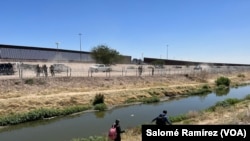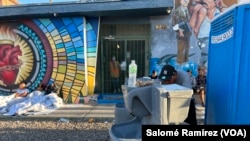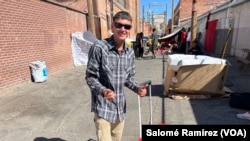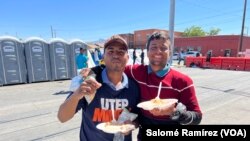One week before the end of Title 42, the Sagrado Corazón church in El Paso, Texas, was filled with bustling streets, sidewalks and alleyways served as makeshift camps for hundreds of migrants who seemed to form a community.
Amidst conversations, accents and sounds, Leidy, a young Colombian woman stopped our team of reporters to talk to us: "the cartel was going to kidnap me; that's why I had to cross."
"I was alone because my friends turned themselves in Tijuana. I was buying water at a supermarket because I was sleeping on the street, when a man stopped me and grabbed my arm, trying to force me into a car.” After a brief struggle, she said, she managed to run in the opposite direction towards the barbed wire fence that separates Mexico and the United States.
The non-profit organization Red Mesas de Mujeres in Ciudad Juárez, Mexico, warns that as of March 2023, around 40 femicides had been committed in the city. In 2022, Juárez was the city with the most rapped crimes in the country, with 709 reported cases.
"I was very afraid," added Leidy, who made her way between the barbed wire fence and found herself in the middle of the Rio Grande, where she later found a space to irregularly cross into the U.S. "I couldn't look back or turn around because I was going to be raped, killed, or kidnapped. I just kept moving forward, to be honest.”
Two days after her irregular entry, Leidy was sleeping on the sidewalk near the Sagrado Corazón church. She wore a new floral shirt and pants that were given to her at a shelter. The only clothes she owned had been damaged while crossing into El Paso. Very worried, she asked every spokesperson from a non-governmental organization how she could legalize her status in the country.
On the same street was Isabel, a young Venezuelan mother, who said she was detained in Mexico for seven days where she was "just sitting on a chair in the cold, sometimes not eating well, because the food had to last all those days."
Upon being released, she felt forced to beg for money on the streets to find rooms in Mexican hotels, but it wasn't enough for food. "I pay for the hotel, but then how do I eat? “On the street, you feel trapped," she said.
Accompanied by her one-year-old son, she decided to surrender to U.S. border authorities and was released with a notice to appear in front of a judge in Chicago three weeks later. In El Paso, she was waiting to gather money to move to the city where she hoped to start a new life.
The United Nations Refugee Agency warns that "the lack of documents and resources, as well as restrictions on regular border crossings, have forced women to use increasingly dangerous routes with the presence of criminal groups and limited institutional response."
A Community Dreaming Together
For those of us coming from Latin American countries, the sounds in downtown El Paso can feel familiar, almost like a public square. From the calls of a man selling cigarettes for a dollar, to the announcement of a barber offering his services to potential customers looking for a haircut.
The scenes, at times chaotic, reflect, for example, the desperation of a Cuban migrant running from one end of the square to the other, asking if anyone has seen his passport, which he likely misplaced in one of the portable restrooms.
Nearby, a woman bathes her young child in a portable sink provided by the city.
A little further ahead, we come across Abraham, an 18-year-old, as he announces the sale of sodas from a portable cooler. The young Venezuelan stated that he did it to avoid begging for money on the street and at the same time, "help fellow countrymen."
With each sale, he hoped to gather money for bus tickets to Denver, the U.S. city he wanted to reach. He recounted that the portable cooler was given to him by a woman after he did a cleaning job in her garden in El Paso, and with the additional payment, he managed to buy the sodas and ice.
One of his customers, Ricardo, also Venezuelan, said he was hoping that his relatives would send him money so he could leave El Paso. The 23-year-old young man, visibly shaken, stated that he was kidnapped in Ciudad Juárez, Mexico, several weeks ago and was released after he handed over all the money he had to kidnappers. That circumstance, he affirmed, forced him to irregularly cross into the U.S.
"It was very tough," he repeats often.
Human Rights Watch estimates that migrants in Mexico "are often victims of abuses such as kidnappings, extortion, and sexual violence by criminal groups”. As of 2022, at least 6,000 cases of kidnapping or other violent attacks against individuals expelled from the U.S. to Mexico had been documented.
Ricardo, for example, said that members of a "criminal gang" not only took away the money he had but also stole all the few belongings he had during his journey, including his cell phone, which he used to stay in touch with his family.
Before we said goodbye, he told us what worries him most: "...to be deported to Mexico, I would prefer to be sent back to my country, but not to a place where they kill you."
You can read the original story in Spanish: Apuntes de una reportera: el miedo de los migrantes al crimen organizado en México no entiende de género.











